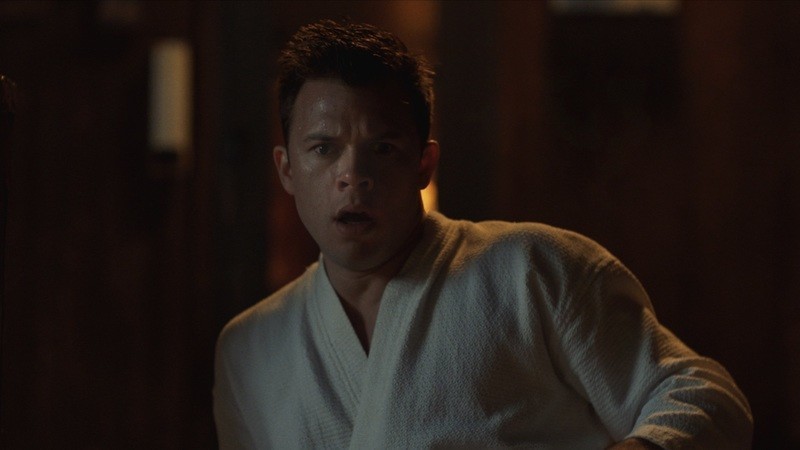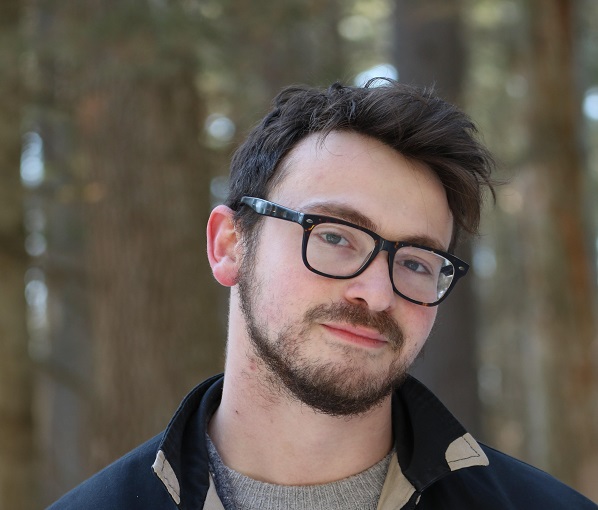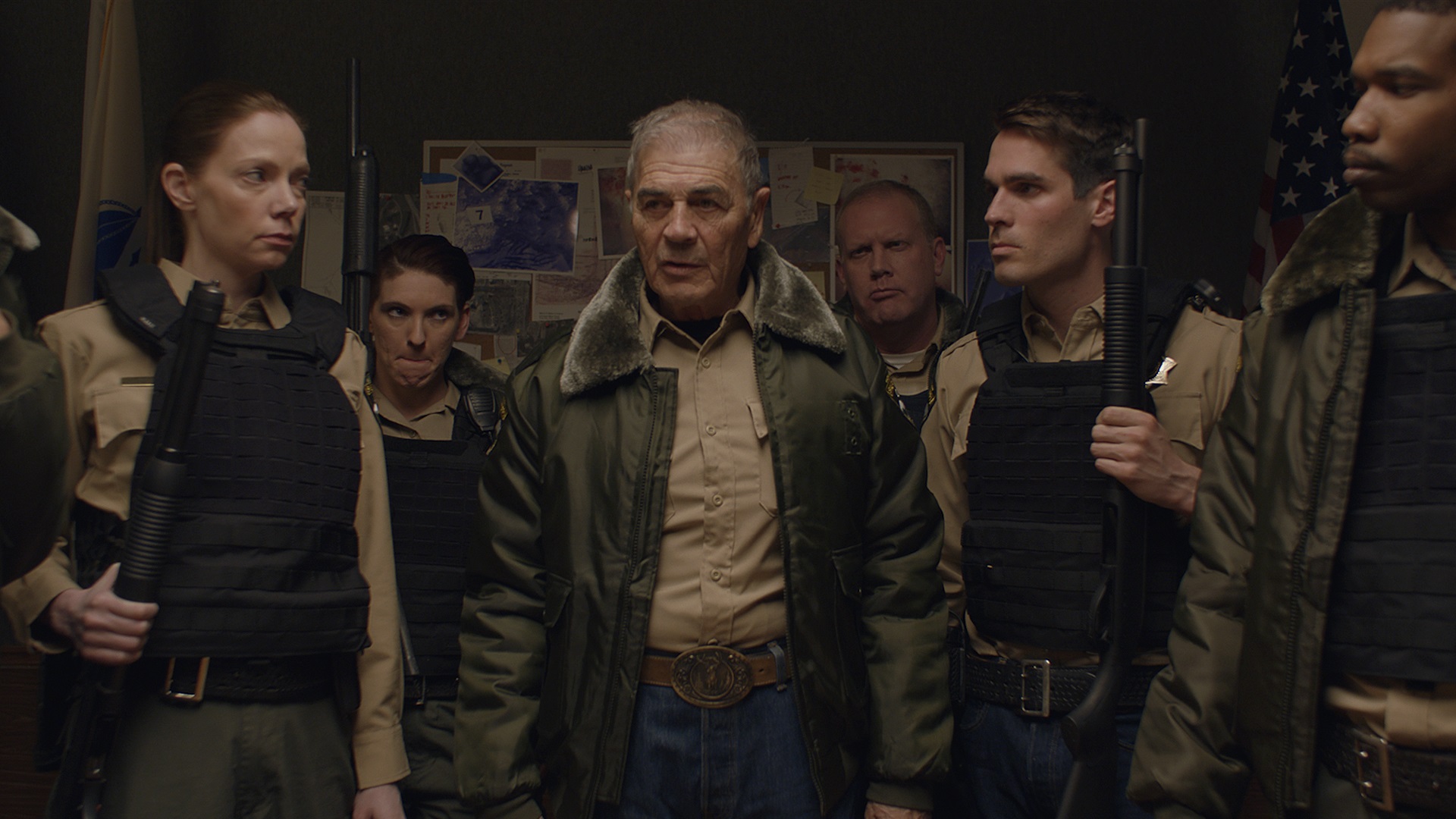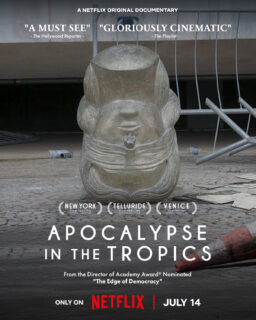There may be no such thing as werewolves, but Jim Cummings is no stranger to men who wrestle with inner monsters.
In his SXSW-winning feature, 2018’s “Thunder Road,” the writer/director also starred as a well-meaning Texas cop who crumbles after his mother’s passing; the way his character unconsciously drew his gun during a climactic shouting match with fellow officers spoke volumes about Cummings’ humane yet unflinching perspective on modern policing.
With this week’s “The Wolf of Snow Hollow,” a comedy-horror hybrid made with the backing of Orion Classics, Cummings is back in uniform and peering into even darker corners of the fractured male psyche. When a spree of animalistic killings stains the snow red in his backwoods-Utah ski-resort town, short-fused cop John Marshall (Cummings) hunts for the serial killer he believes responsible, only to grow frustrated by others considering a more supernatural culprit. A recovering alcoholic working to salvage relationships with his estranged daughter (Chloe East) and an ailing father who’s also the local sheriff (the late Robert Forster, in his final screen role), John was already under intense pressure. But as bodies pile up and his cooler-headed partner (Riki Lindhome) begins to question his judgment, John approaches a breaking point.
With Cummings starring, writing, and directing, as he did on “Thunder Road,” it’s scarcely surprising that “Wolf of Snow Hollow” is perched upon a similarly tricky tonal tightrope, balancing out slapstick humor with bone-shattering violence. As Orion Classics prepares to release the film in select theaters and on VOD this Friday, RogerEbert.com spoke with Cummings about reimagining the werewolf genre, working with Forster, and why he keeps playing cops.
I know you wrote this script a while back, even before expanding “Thunder Road” from a short into a feature. Out of all the movie monsters you could have reinterpreted, what appealed to you initially about the werewolf?
The myth of the werewolf is, really, about anger. It’s about a guy who doesn’t have control over his anger once a month, so he goes out and kills people. It’s closer to a serial killer story. I was reading the books of [FBI criminal profiler] John E. Douglas and watching the first season of “Mindhunter.” I read every book by Douglas; he was the one who inspired “The Silence of the Lambs.” That author, Thomas Harris, hung out at the FBI Academy in Quantico, and Douglas played recordings of serial killers. It was one of the first serial-killer movies that was inspired by John’s work. I thought I could do a horror movie, in the style of “Zodiac,” but as a comedy. And it’s kind of structured that way, all of the montages and sequence editing. It feels Fincher-esque, though it’s also almost Danny McBride-style comedy.
How did you strike that tonal balance?
In the same way I made “Thunder Road,” I made a podcast of the screenplay. That way, I could do all the dialogue and stage direction and then put in music and sound design. I did all this in Utah, after moving out there two months early, before the shoot. I recorded it in our little hotel room, and then I was able to hear the movie out loud, to get the tone right by feeling out when it wasn’t working. Tonally, it’s comedy-drama-horror, and you can feel that out by listening to it: knowing when the jokes land, when the jump-scares work, and when they don’t.

This is Robert Forster’s final film. He’s terrific playing the sheriff of this snowy ski town, who’s world-weary, weather-beaten, and still lightning-quick with a one-liner. What was it like to work with such a giant, particularly given that he’s playing your on-screen father?
I’m glad I took it as seriously as I did, needing to impress this guy. It’s weird, because he came on set as my biggest fan, as a huge supporter of mine, wanting to make sure we got it right and that I got everything I needed. And we all took it seriously, because this was Bob Forster, from “Jackie Brown,” who was going to add so much realism to this sheriff’s department. Yet, he was able to do all the funny slapstick! In one of my favorite scenes, he’s coming out for what you think is going to be a press conference, and it turns out to just be his buddy trying to plant a story in the local newspaper. And the reporter keeps saying “massacre,” and Bob keeps going away and walking back, and it’s this slapstick scene in the middle of a blizzard, grown men shouting at each other in a parking lot. He’s able to do all the serious, old-man, end-of-life stuff, but he could also do the Chaplin routine better than I could. It was such a fun experience working with the guy every minute.
More than “Thunder Road,” this film looks at alcoholism in a direct, nightmarish way. The most brutal part of the movie, to me, is a scene where John’s life has become unmanageable, his drinking has worsened dramatically, and his daughter, Jenna (Chloe East), is begging him to just go to bed in the midst of a drunken episode.
It’s ugly and American and realistic. That was probably the hardest scene to shoot on set. Chloe is in the doorway, and her mom was right outside telling me, “Sorry, she deals with a lot of this stuff.” Every American household deals with this stuff. My brother, I read him the script over Christmas, has been in the program [meaning Alcoholics Anonymous] for ten years now. And I sat him down to ask about a scene in which he drinks Listerine from the bottle, to ask if it was too much. And he said, “No, it’s 16.5 percent alcohol.” He knew the alcohol content in Listerine, and also that they put in a certain chemical to make you vomit if you drink too much of it. To fuse that with the werewolf story, it really is that idea; when you relapse, it’s incredibly shameful and you don’t want to tell anyone about it. That must be what it’s like to be a werewolf.
Between “Thunder Road” and “The Wolf of Snow Hollow,” your films also explore policing in an era when police violence and brutality keeps spilling out onto the national stage. There’s an earnest, threatening urgency to your characters in these films: both sad-sack police officers tangling with their own dangerous, thwarted masculinity. Tell me about that.
That’s exactly it. It’s this earnest, threatening urgency, of people who have a huge amount of testosterone as well as a desire to find justice and do the right thing. I’ve met a lot of law enforcement officials, and their favorite movies—you can ask any of them—are Batman, Superman, and “Fast & Furious” movies. These are people who have an idea in their mind about being protectors, of the thin blue line between order and chaos. That can also be an incredibly dangerous, sociopathic place to live, thinking you’re Rikki-Tikki-Tavi with a pistol. When you have a hammer, everything looks like a nail. To put in that place type-A people who steamroll others in their normal lives, it creates incredibly toxic workplaces, especially for women. It’s a very strange time to talk about the police. But it’s funny to make slapstick comedies about them. You can do both at the same time: you can humiliate and humanize these people. That’s important. Chaplin did that with “The Great Dictator.” If you can make jokes about this stuff, it gives people ammunition to deal with it in their normal lives.

It’s exciting to see you partner with Orion Classics, which MGM has recently revived, and to see Orion’s classic logo opening the film, as it did “The Silence of the Lambs” back in 1991. What was that process like, getting a greenlight from them?
You’ll find this funny. [Vanishing Angle co-founder and president] Matt Miller and I were going to pitch “The Wolf of Snow Hollow” to Orion. The screenplay was ready, and we were already talking to different states to get tax incentives to shoot it. We knew we wanted to shoot it, and they were on the fence. We drove to the meeting, and I realized I’d parked in the wrong parking lot, which was six blocks away. Five minutes before the meeting, we realized it was a 20-minute jog through Beverly Hills for both of us, in dress shoes. It was the biggest cliché in Hollywood, of getting greenlit after sprinting to make it late to the meeting, apologizing, then getting halfway through to have them say, “Yeah, consider yourselves greenlit.” We’re sweating and chugging bottles of water. It felt like we shouldn’t have been either involved or allowed in the building.
It’s similarly great to see so many of your collaborators at Vanishing Angle, with whom you’ve collaborated across this last decade, in supporting roles on-screen and off. Even under the Orion banner, this feels just as personal as “Thunder Road” in that it’s made with that same family of friends and collaborators.
It’s crazy to grow up with the same team making short films and then, just by having these small successes in shorts and growing them into features, you get to keep the same team, the same people who make you laugh and make you cry. It’s such a wonderful thing to level up together, to make our first studio movie. It was crazy, to have all my best friends on set—and to be murdering one of them.
You see rising talent in the independent film sphere getting snapped up by Hollywood left and right, disappearing into that matrix. With Vanishing Angle, though, you’ve carved out this full-service production company that self-distributes films, while acting as an incubator for talent. What has it been like to build that?
It really hit us at Sundance. Danny Madden—who’s the creative director for “Wolf of Snow Hollow” and “Thunder Road”—wrote, directed, and edited a film there this year, “Beast Beast.” When the Vanishing Angle logo came up during the Sundance screening, the entire crowd clapped. And that was really weird. This goofball summer camp that we’ve created over the past ten years has gotten enough street cred that people identify it in the same way that I would clap when I saw an A24 movie. It’s really strange. It sneaks up on you at times. And it’s never lost on me that that’s an incredible thing. If someone reaches out to me and asks me to watch their short film, that is what that means: that we’ve been working hard, people are liking our stuff, and we’ve accidentally become one of the champs of indie film, just by doing it long enough.
Available this Friday in select theaters and on video-on-demand.












